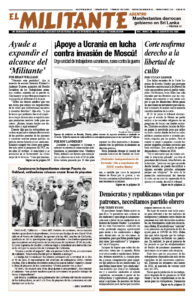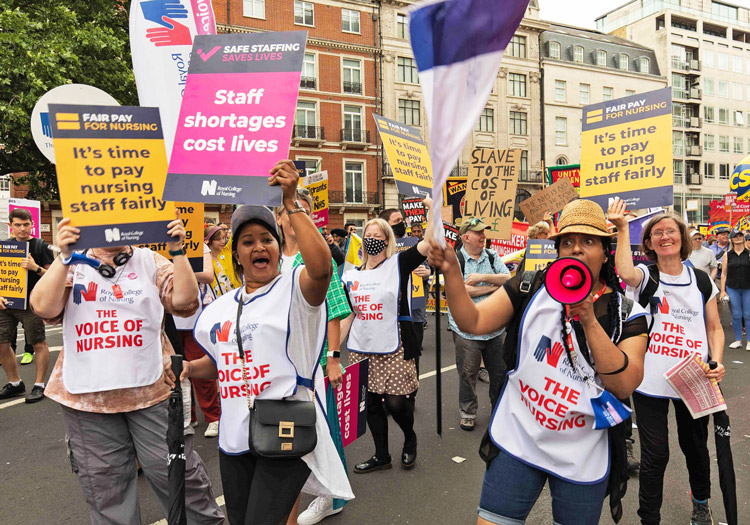LONDON — U.K. Prime Minister Boris Johnson resigned as Conservative Party leader July 7, forced out by mounting pressure from working people and former supporters, and a tsunami of ministerial resignations. Fifty members of Parliament quit the government in just 48 hours. The crisis reflects the rulers’ nervousness about how to deal with London’s place in the shifting world order and rising working-class anger toward assaults on living standards.
Skyrocketing prices, worsening working conditions, grueling shift schedules, deteriorating health care and housing, and rising drug and gambling addiction mark a broad capitalist crisis here. To defend themselves and their families from its effects, hundreds of thousands of rail, postal, telecom and other workers have voted for strikes. Rail unions have set dates for nationwide stoppages in July and August.
The rulers face these challenges amid a worldwide economic slowdown, the post-Brexit failure to reverse the decline of the U.K.’s capitalist economy, and sharpening conflicts with rivals as a major land war in Europe unfolds in Ukraine. They also face a renewed crisis over British rule in Northern Ireland.
Johnson remains prime minister until Sept. 5 when the Conservative Party will have chosen his successor. A dozen party members of Parliament threw their hats in the ring to replace him.
Just 30 months ago the Conservatives won a landslide general election victory. Johnson won votes of millions of workers with pledges to “level up” their conditions, reverse the deep-seated crisis and “get Brexit done.” He won out against the big-state vision and “political correctness” of the pro-European Union Labour Party, then led by Jeremy Corbyn. Labour’s vote held up among the middle class in big cities and university towns, but shattered among working people in the party’s former heartlands and in rural areas. Labour leaders then contemptuously condemned workers for having voted for Johnson.
The propertied rulers sided with the Conservatives despite opposition of many to Johnson’s drive to quit the EU. They saw a Johnson-led government as a way to end the political paralysis that dogged the government of former Prime Minister Theresa May, and to keep out Corbyn.
Coalition crashes on class realities
Johnson’s downfall lies in the ongoing crisis and coming apart of the electoral coalition he put together. When he was elected he said that many former Labour-voters “lent” him their vote and his government must act to honor their trust. But since then workers’ lives and livelihoods have been hammered.
Real wages have been cut. Half a million have left the workforce since the pandemic. Many of those working have temporary and agency jobs, with over a million hired on zero-hours contracts.
“Jobs are so precarious,” Dave Hutton told the Militant. The former care home worker lost his job five years ago. “I started food deliveries. Some days you can earn 12 pounds ($14) an hour, but then you remember the day before you only got 5 pounds an hour.”
The Johnson government’s pandemic policies led to the elderly and those in care homes being killed off in their thousands. Paltry provision of health care meant thousands more dying unnecessarily of cancer. Today, 6.6 million people, 10% of the U.K. population, are on hospital waiting lists. “While we’ve faced horrendous COVID conditions, the government lived differently,” retail worker Shamin Ahmed said. “This is not a government for working people.”
Nor did the government satisfy the rulers. British capitalism is mired in “stagflation.” Inflation stands at more than 11%, the highest in the imperialist world, while economic growth and productivity are the lowest. Johnson’s trumpeted spur to business investment has proved ineffective. His forecast of a free-trade deal with the United States is a distant dream.
The Conservative Party got hammered in two recent by-elections. Some Conservative members of Parliament turned on the government, accusing it of corruption and Johnson of lying. A pro-Brexit media commentator, Andrew Neil, complained that Johnson “acted as if the rules didn’t apply to him,” by breaching his own government’s lockdown rules.
Nigel Farage, former leader of the Brexit Party, criticized Johnson for getting elected as a conservative but governing as a liberal. Under Johnson the state has grown, taxation increased and policies have been adopted based on climate-change hysteria.
The Labour Party joined the anti-Johnson chorus, despite the party backing all the government’s major calls — endorsing its COVID and “green” policies and condemning workers taking strike action to defend themselves. As Moscow’s war has raged in Ukraine, Labour leader Keir Starmer has burnished Labour’s credentials as a party that can defend ruling-class interests amid rising worldwide conflicts. He pointed to Labour’s record as the governing party that helped lead the establishment of the imperialist NATO alliance in 1949, under Foreign Secretary Ernest Bevin.
“There’s really no real difference between Labour and Conservatives,” Charni Wiggins, a software company worker, told the Militant.
Johnson’s replacement will do nothing to protect workers from the rulers’ drive to put the crisis of their system on our backs. Nor will it turn around the fortunes of British capitalism. Continued attacks on working-class living standards and political instability are guaranteed, posing the need for workers to organize independently of the bosses and build our own party.


